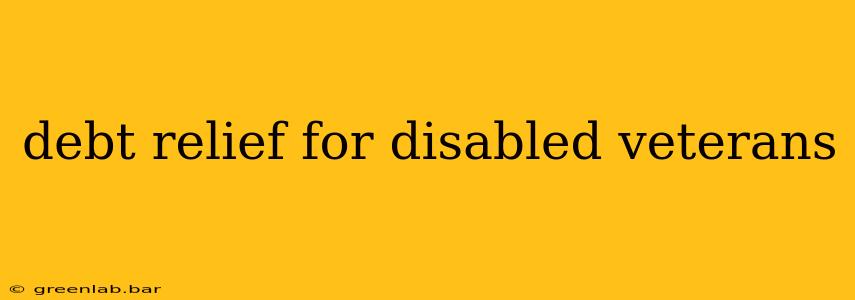The transition from military service to civilian life can be challenging for all veterans, but for disabled veterans, the complexities are often amplified. Physical and mental health conditions can impact employment prospects, leading to financial strain and mounting debt. Fortunately, various resources and programs exist to provide debt relief for disabled veterans. This comprehensive guide explores these options, empowering you to navigate your financial challenges and find solutions.
Understanding the Unique Financial Needs of Disabled Veterans
Disabled veterans often face unique financial hurdles. Service-connected disabilities can lead to:
- Reduced earning capacity: Physical limitations or mental health conditions can restrict employment opportunities and limit income potential.
- Increased medical expenses: Ongoing healthcare costs associated with service-connected disabilities can significantly impact finances.
- Difficulty managing finances: Mental health conditions like PTSD or TBI can make managing finances challenging.
Debt Relief Programs and Resources for Disabled Veterans
Several federal and state programs offer financial assistance and debt relief specifically tailored to the needs of disabled veterans.
1. Debt Consolidation and Management Programs
- VA Loan Guaranty: This program isn't strictly debt relief, but it allows veterans to purchase a home with a VA-backed loan, often with more favorable terms than conventional mortgages. This can help consolidate high-interest debts and potentially lower monthly payments.
- Credit Counseling Agencies: Nonprofit credit counseling agencies can help create a debt management plan, negotiating with creditors to lower interest rates and monthly payments. They can also provide financial education and budgeting assistance. Choose a reputable agency accredited by the National Foundation for Credit Counseling (NFCC).
2. Government Assistance Programs
- Supplemental Security Income (SSI): SSI provides monthly payments to disabled adults and children with limited income and resources. This can help cover basic living expenses and alleviate some financial pressure.
- Social Security Disability Insurance (SSDI): SSDI provides benefits to disabled individuals who have worked and contributed to Social Security. Eligibility requirements are based on work history and the severity of the disability.
- VA Disability Compensation: This monthly payment is provided to veterans with service-connected disabilities, rated based on the severity of the condition. The amount received can significantly impact their ability to manage debt.
3. State and Local Programs
Many states offer additional programs to assist disabled veterans with debt relief. These programs vary significantly, so it's essential to research the specific resources available in your state. Contact your local veteran affairs office for details.
4. Charitable Organizations and Nonprofits
Numerous charitable organizations and nonprofits provide financial assistance and support to disabled veterans facing debt. These organizations often offer grants, emergency financial assistance, and debt counseling services. Research organizations in your area specializing in veteran support.
Proactive Steps to Manage Debt
While accessing available debt relief programs is crucial, proactive debt management strategies are equally important.
- Create a Budget: Track your income and expenses to identify areas where you can cut back and allocate funds towards debt repayment.
- Negotiate with Creditors: Contact your creditors directly to explain your situation and explore options for reducing interest rates or modifying payment plans.
- Seek Financial Counseling: Professional financial advisors can provide personalized guidance on managing your debt and creating a long-term financial plan.
Conclusion: Hope and Support for Disabled Veterans
Facing significant debt can be overwhelming, but disabled veterans are not alone. By understanding the available resources and taking proactive steps, you can navigate financial challenges and build a more secure future. Utilize the programs and resources mentioned above, and remember to seek professional assistance when needed. Your service and sacrifice deserve support, and help is available. Remember to reach out to veteran service organizations and government agencies for personalized guidance.

